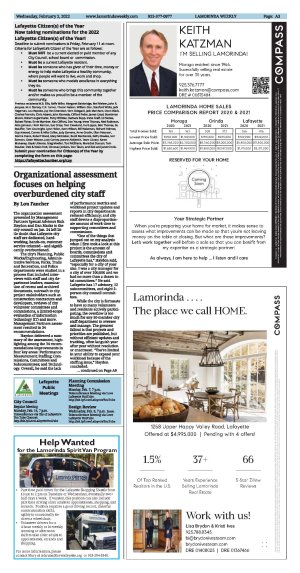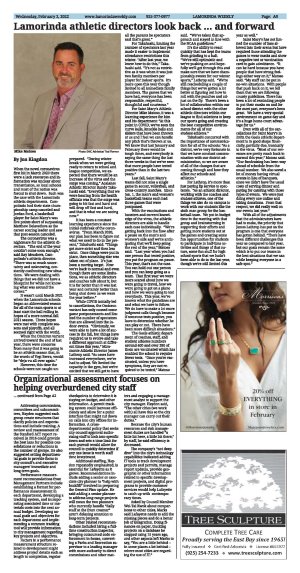| | Published February 2nd, 2022
| Organizational assessment focuses on helping overburdened city staff
| | | By Lou Fancher | | |
The organization assessment presented by Management Partners Special Advisors Rick Haydon and Dan Marks to the city council on Jan. 24 left little doubt that Lafayette city staff are dedicated, hardworking, hands-on, customer service oriented - and significantly overburdened.
 The city's Planning, Public Works/Engineering, Administrative Services, Parks, Trails and Recreation, and Police departments were studied in a process that included interviews with staff and city department leaders, examination of recent and archived documents, outreach to city project stakeholders such as construction contractors and developers, reviews of city volunteer committees and commissions, a limited-scope evaluation of information technology (IT) and more. Management Partners assessment resulted in 34 recommendations.
The city's Planning, Public Works/Engineering, Administrative Services, Parks, Trails and Recreation, and Police departments were studied in a process that included interviews with staff and city department leaders, examination of recent and archived documents, outreach to city project stakeholders such as construction contractors and developers, reviews of city volunteer committees and commissions, a limited-scope evaluation of information technology (IT) and more. Management Partners assessment resulted in 34 recommendations.
 Haydon delivered a summary of the assessment, highlighting among the 34 recommendations improvements in four key areas: Performance Measurement; Staffing; Commissions, Committees and Subcommittees; and Technology. Overall, he said the lack of performance metrics and workload project updates and reports in city departments reduced efficiency; and city staff devote a disproportionate amount of work time to supporting committees and commissions.
Haydon delivered a summary of the assessment, highlighting among the 34 recommendations improvements in four key areas: Performance Measurement; Staffing; Commissions, Committees and Subcommittees; and Technology. Overall, he said the lack of performance metrics and workload project updates and reports in city departments reduced efficiency; and city staff devote a disproportionate amount of work time to supporting committees and commissions.
 "One of the things that jumped out on my analysis when I first took a look at this project is the amount of boards, commissions and committees the city of Lafayette has," Haydon said, "especially for a city of your size. I was a city manager for a city of over 100,000 and we had no more than a dozen total committees." He said Lafayette has 17 advisory, 12 subcommittees, and eight 2-person city council committees.
"One of the things that jumped out on my analysis when I first took a look at this project is the amount of boards, commissions and committees the city of Lafayette has," Haydon said, "especially for a city of your size. I was a city manager for a city of over 100,000 and we had no more than a dozen total committees." He said Lafayette has 17 advisory, 12 subcommittees, and eight 2-person city council committees.
 While the city is fortunate to have so many volunteers and residents actively participating, the overflow is too much for any 50-member city staff department to oversee and manage. The greatest fallout is that projects and priorities are published, but without efficient updates and tracking, often languish year after year without resolution or enactment. "You're limited in your ability to expand your workload because of the staffing issue," Haydon concluded.
While the city is fortunate to have so many volunteers and residents actively participating, the overflow is too much for any 50-member city staff department to oversee and manage. The greatest fallout is that projects and priorities are published, but without efficient updates and tracking, often languish year after year without resolution or enactment. "You're limited in your ability to expand your workload because of the staffing issue," Haydon concluded.
 Addressing commissions, committees and subcommittees, Hayden suggested each group create structures that clarify policies and expectations and include training. A review and reassessment of the Stanford ACT report received in 2016 could provide the best lens for possible consolidations or reductions in the number of groups. He also suggested setting departmental goals to provide focus to city council's and executive managers' immediate and long-term goals.
Addressing commissions, committees and subcommittees, Hayden suggested each group create structures that clarify policies and expectations and include training. A review and reassessment of the Stanford ACT report received in 2016 could provide the best lens for possible consolidations or reductions in the number of groups. He also suggested setting departmental goals to provide focus to city council's and executive managers' immediate and long-term goals.
 Performance measurement recommendations from Management Partners include establishing a format for performance measurement in each department, developing a tracking system, and incorporating associated time or materials costs into the next annual budget. Developing annual goals and objectives for each department and implementing a common tracking tool will provide information to city management regarding key projects and objectives.
Performance measurement recommendations from Management Partners include establishing a format for performance measurement in each department, developing a tracking system, and incorporating associated time or materials costs into the next annual budget. Developing annual goals and objectives for each department and implementing a common tracking tool will provide information to city management regarding key projects and objectives.
 Factors in a performance measurement structure related to development might address project details such as length to completion, regular checkpoints to determine it is staying on budget, and other information. A permit tracking system could increase efficiency and allow for a pubic interface that might cut down on calls into city offices for information. A cross-departmental policy that seeks city council approval authorizing staff to look into specific items and sets a time limit for each pursuit would allow the council to quickly determine if any one issue is worth staff time investment.
Factors in a performance measurement structure related to development might address project details such as length to completion, regular checkpoints to determine it is staying on budget, and other information. A permit tracking system could increase efficiency and allow for a pubic interface that might cut down on calls into city offices for information. A cross-departmental policy that seeks city council approval authorizing staff to look into specific items and sets a time limit for each pursuit would allow the council to quickly determine if any one issue is worth staff time investment.
 Additional staffing, Haydon repeatedly emphasized, is essential for Lafayette as it grows. Recommendations include adding a senior or associate city planner to "help with backfill" involved in preparing the General Plan update. He said adding a senior planner to address long-range projects will mean the two planners who currently handle "daily stuff at the front counter" aren't delaying attention to long-term projects.
Additional staffing, Haydon repeatedly emphasized, is essential for Lafayette as it grows. Recommendations include adding a senior or associate city planner to "help with backfill" involved in preparing the General Plan update. He said adding a senior planner to address long-range projects will mean the two planners who currently handle "daily stuff at the front counter" aren't delaying attention to long-term projects.
 Other related recommendations included hiring a full-time construction inspector, bringing outsourced code enforcement in-house, converting a Parks and Recreation supervisor to a leading manager with more authority to direct commissions and other matters and engaging a management analyst to support the city manager. Haydon said, "The other cities (we work with) all have this so the city manager can carry out their duties."
Other related recommendations included hiring a full-time construction inspector, bringing outsourced code enforcement in-house, converting a Parks and Recreation supervisor to a leading manager with more authority to direct commissions and other matters and engaging a management analyst to support the city manager. Haydon said, "The other cities (we work with) all have this so the city manager can carry out their duties."
 Because the city's human resources and risk management duties are handled "a little bit here, a little bit there," by staff, he said efficiency is decreased.
Because the city's human resources and risk management duties are handled "a little bit here, a little bit there," by staff, he said efficiency is decreased.
 The company's "not deep dive" into the city's technology capabilities indicated adding IT tools to track development projects and permits, manage report updates, provide geographic or other information related to specific development projects, and digital programs to provide customer services would help Lafayette to catch up with contemporary times.
The company's "not deep dive" into the city's technology capabilities indicated adding IT tools to track development projects and permits, manage report updates, provide geographic or other information related to specific development projects, and digital programs to provide customer services would help Lafayette to catch up with contemporary times.
 Asked by Council Member Wei-Tai Kwok about comparisons to other cities, Marks said Lafayette needs to add the missing pieces and do a better job of integration. Doing finances on paper, tracking projects on a database he stopped using 15 years ago, and other aspects left Marks to say, "You are a little behind - in some places a lot behind - where most cities are regarding the use of IT."
Asked by Council Member Wei-Tai Kwok about comparisons to other cities, Marks said Lafayette needs to add the missing pieces and do a better job of integration. Doing finances on paper, tracking projects on a database he stopped using 15 years ago, and other aspects left Marks to say, "You are a little behind - in some places a lot behind - where most cities are regarding the use of IT." |
| | | | | | | | | | | | |



